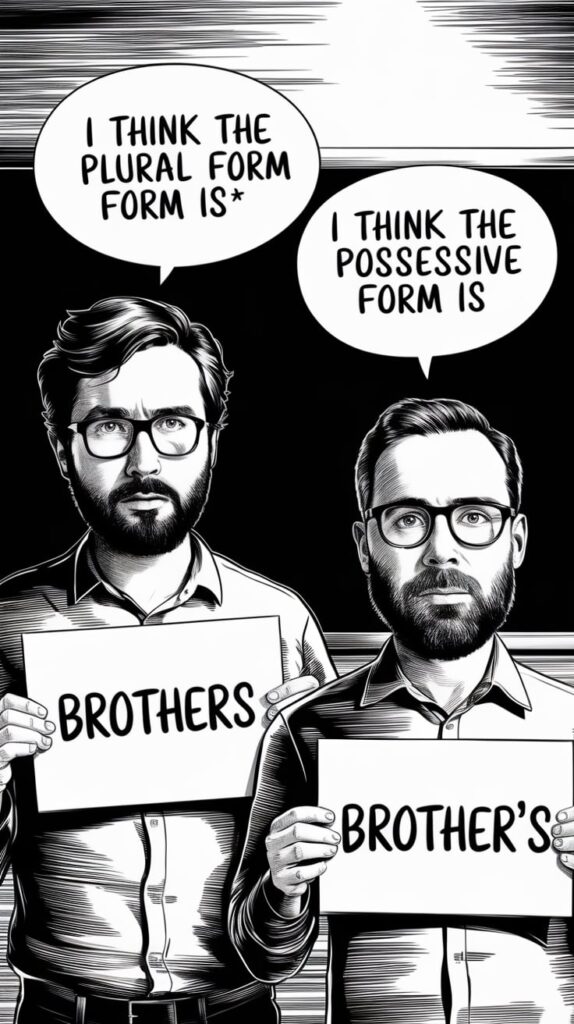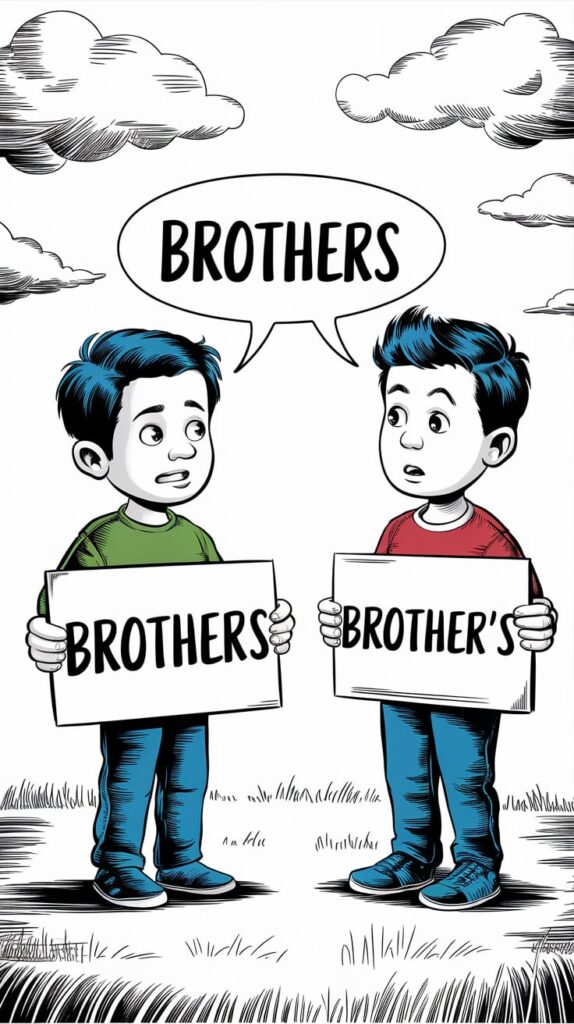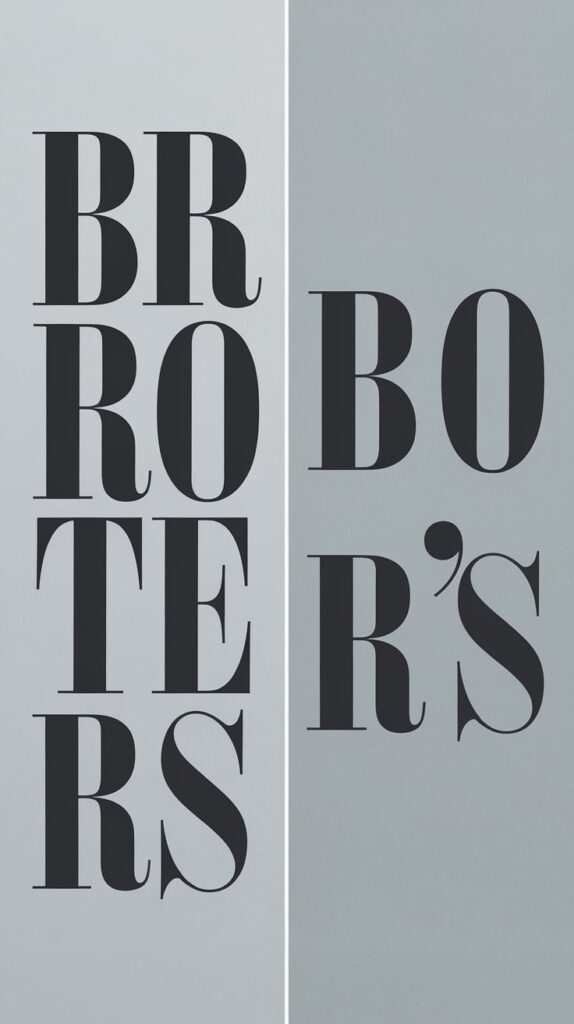The English language can sometimes be tricky, especially when it comes to subtle differences in spelling and grammar. One such common confusion arises between the words “brothers” vs “brother’s”.
Though these two words may seem similar at first glance, understanding their proper usage is essential for writing with accuracy and clarity.In this article, we will break down the significance of understanding “brothers” vs “brother’s” by exploring the rules surrounding possessive forms and plural forms.
We will explain the differences between these terms and provide real-world examples to illustrate the correct usage in various contexts. By the end of this article, you’ll have a clear grasp of these terms and how to apply them in your writing.
read more : What is the Collective Noun for Keys? – Grammar Beacon
What’s the Difference Between Brothers and Brother’s?

At the core of this question lies the distinction between plural and possessive forms in English. Let’s first understand the grammatical rules that govern how these two forms are used.
The Apostrophe and Possession: A Key Concept
In English grammar, the apostrophe is a punctuation mark that serves several purposes, but its most important function is to indicate possession. When you want to express that something belongs to someone, you use an apostrophe followed by the letter “s”. However, the apostrophe’s placement differs depending on whether the noun is singular or plural. This is where many people make mistakes.
Singular Possession:
When something belongs to one person or thing, we use the singular possessive form. For example, if a brother owns a toy, we would say:
- This is my brother’s toy.
In this case, the apostrophe goes before the “s” because only one brother is the owner.
Plural Possession:
When something belongs to more than one person or thing, we use the plural possessive form. The plural form of “brother” is brothers, and when we want to show possession by multiple brothers, we add an apostrophe after the “s”:
- These are the brothers’ toys.
In this example, the toys belong to more than one brother, and the apostrophe follows the plural “s” because the possession is shared by multiple brothers.
Plural Form:
It’s important to distinguish the plural form from the possessive form. The plural form of “brother” is brothers, and it simply indicates more than one brother, without implying ownership. There is no apostrophe in the plural form:
- I have two brothers.
- Both brothers like playing football.
Singular Possession:
As previously mentioned, when something belongs to one brother, you use the singular possessive form. Here are some additional examples that will help you understand this concept better:
- My brother’s room is always tidy.
- Did you borrow brother’s jacket again?
- The brother’s decision was final.
In each of these examples, the apostrophe comes before the “s” because we’re referring to something that belongs to one brother.
Plural Possession:
Now let’s dive into plural possession. When you’re referring to more than one brother and want to indicate that something belongs to them, the apostrophe comes after the “s” in the plural form:
- The brothers’ toys were left outside in the rain.
- I saw the brothers’ car parked by the curb.
- The brothers’ opinions were unanimous.
The apostrophe in the examples above is placed after the “s” to show that the possession is being shared by multiple brothers. It’s crucial not to place the apostrophe before the “s” because that would imply singular possession, which would be grammatically incorrect.
Common Mistakes with Brothers vs Brother’s

While the rules for using “brother’s” and “brothers” are clear, many people still make mistakes. These mistakes can confuse the reader and impact the clarity of the message. Let’s look at two of the most common mistakes:
Mistake #1: Confusing Plural and Possessive Forms
One of the most frequent mistakes people make is confusing the plural form brothers with the possessive form brother’s. They might use brothers when they should use brother’s, or vice versa. This leads to incorrect phrasing and confusion.
Example of Incorrect Use:
- My brothers’ bicycle is missing.
- I’m taking brother’s book to school today.
The first sentence uses the plural form brothers when the possession is supposed to belong to only one brother. The second sentence mistakenly uses brother’s instead of brothers’, when referring to a shared possession between multiple brothers.
Corrected Sentences:
- My brother’s bicycle is missing.
- I’m taking the brothers’ book to school today.
In the first corrected sentence, brother’s refers to one brother’s possession. In the second, the brothers’ indicates shared possession of the book between multiple brothers.
Mistake #2: Misplacing the Apostrophe
Another common mistake occurs when the apostrophe is misplaced. People often place the apostrophe in the wrong position, either before the “s” when referring to plural possession or after the “s” when referring to singular possession. This results in incorrect grammar.
Example of Incorrect Use:
- I borrowed the brother’s shoes.
- The brothers’ car was parked in front of the house.
In the first sentence, the apostrophe is incorrectly placed before the “s,” suggesting that only one brother owns the shoes, when the writer likely meant to refer to multiple brothers. In the second sentence, the apostrophe is placed correctly for plural possession.
Corrected Sentences:
- I borrowed the brothers’ shoes.
- The brothers’ car was parked in front of the house.
In both corrected sentences, the apostrophes are placed correctly to indicate plural possession.
How to Use Brothers vs Brother’s Correctly
To master the use of “brothers” and “brother’s”, let’s break it down clearly:
1. Brothers (Plural Form)
Use brothers when you’re simply referring to more than one brother and are not indicating possession. There is no apostrophe in the plural form.
Example:
- I have two brothers.
- The brothers are planning a surprise for their parents.
2. Brother’s (Possessive Form)
Use brother’s when something belongs to one brother. The apostrophe is placed before the “s.”
Example:
- I borrowed my brother’s car.
- Has anyone seen John’s brother’s wallet?
3. Brothers’ (Plural Possession)
Use brothers’ when you’re referring to something that belongs to more than one brother. The apostrophe is placed after the “s.”
Example:
- The brothers’ house is on the corner of the street.
- The brothers’ laughter filled the room.
Example Scenarios
Now let’s apply these rules to real-world scenarios to demonstrate how you would use these terms in various writing contexts.
Scenario 1: Writing a Family Update Email
Imagine you’re writing an email to your relatives, updating them on the upcoming family reunion. Here’s how you might use “brothers” and “brother’s” in a casual but grammatically correct way:
- Subject: Family Reunion Update
- Dear Family,
- I just wanted to let you all know that my brother’s birthday is next month. We’ll be celebrating at his place, and the brothers are really looking forward to it. I’ve attached the details of the event.
- I hope to see you all there!
In this email, “my brother’s” refers to something that belongs to one brother (his birthday celebration), while “the brothers” refers to multiple brothers excited about the reunion.
Scenario 2: Family Group Text
Another scenario might be a group text between siblings about a family event. Here’s an example of how the terms would appear in a more casual format:
- Sister: Hey, did you guys see brother’s new car?
- Brother 1: Yeah, the brothers’ car collection is growing!
- Brother 2: It’s all happening this weekend—let’s plan to go together.
In this example, “brother’s” refers to something belonging to one brother (his new car), while “the brothers’” refers to the shared possession of the car collection between multiple brothers.
Family Terms in English Grammar

English grammar includes a wide range of family-related terms, such as brother, sister, father, and mother. In each case, when indicating possession, you must apply the same principles:
- Father’s – something belonging to one father
- Father’s (plural) – when more than one father shares ownership
- Mother’s – something belonging to one mother
- Parents’ – something that belongs to multiple parents
Apostrophe Rules: Quick Recap
As a quick recap, let’s go over the key apostrophe rules for possessive nouns:
- Singular possession: The apostrophe goes before the “s” (e.g., brother’s toy).
- Plural form: The apostrophe is not used for simply indicating more than one person or thing (e.g., brothers).
- Plural possession: The apostrophe goes after the “s” (e.g., brothers’ toys).
Grammar Clarification: Plural Form Examples
When you’re using family-related terms in their plural form, remember that no apostrophe is used unless you’re indicating possession. Here are some additional examples:
- The brothers played football all afternoon.
- The parents decided to take a trip abroad.
In these cases, you are simply referring to more than one brother or parent, without indicating possession.
Conclusion: Mastering Brothers vs Brother’s
In conclusion, understanding the difference between “brothers” and “brother’s” is an important step in mastering English grammar, particularly in conveying possession and plurality correctly.
These subtle distinctions are essential for writing accurately and clearly, whether you’re crafting a formal letter, an email to a family member, or a casual group text.Why Understanding “Brothers” vs “Brother’s” Matters is not just a matter of following grammar rules—it’s about ensuring that your writing is as clear and precise as possible.
By paying attention to these distinctions, you’ll avoid common mistakes and be able to communicate your ideas with greater precision.

James Logan is a seasoned blogger and language enthusiast behind Grammar Beacon. With years of experience in grammar and writing, James shares his expertise through insightful and engaging content. His passion for clear communication and linguistic precision shines in every post, making complex grammar concepts accessible and enjoyable for readers. Follow James for expert advice and tips to refine your writing skills.







